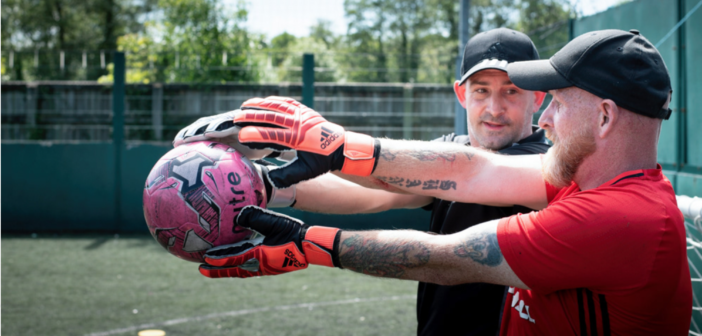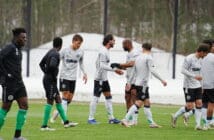The flags are up across the Welsh capital, Cardiff, in anticipation of the Homeless World Cup which kicks off on 27 July.
In his third preview of the tournament Tim Hartley looks at the difference playing in a competition like this makes for men and women who have been homeless or who are getting over addiction.
We are used in our capital city to waving the flag. It’s usually the Welsh dragon during European rugby’s six nations championships. The pedestrianised St Mary’s Street with its bars and restaurants is festooned with banners whipping up expectation of the heroics to come. But Wales has also hosted soccer’s FA and League Cup finals, the UEFA Champions League final, Wales’ home soccer matches and a host of other sporting events. The city council loves to get the flags out and as teams from 50 countries hold their final training sessions the welcome for the Homeless World Cup will be no different.
I went down to the Civil Service ground in Newport to meet Keri Harris, the squad manager for the Wales men’s and women’s teams. He was at the first World Cup in Graz in 2003, has managed the Wales squads since then and now runs Street Football Wales. He knows the power of the game to change lives. ‘I remember one of my team back then at the first World Cup was an agoraphobic lad. Just being there was a really big thing for him. We got him to carry the flag in the opening parade. I saw him change before my eyes.’
![]() Another player Kerri has helped to get his life back on track is Wayne. ‘I’ve come from a situation where I had almost given up on life,’ said Wayne who was released from prison in 2013. Two years later he met Kerri who gave him the opportunity to play in the finals in Amsterdam. ‘The Homeless World Cup is such an amazing experience,’ said Wayne. ‘There’s food, music, fun. There’s laughter. There’s representatives from the rest of the world. The flair on the pitch is phenomenal.’
Another player Kerri has helped to get his life back on track is Wayne. ‘I’ve come from a situation where I had almost given up on life,’ said Wayne who was released from prison in 2013. Two years later he met Kerri who gave him the opportunity to play in the finals in Amsterdam. ‘The Homeless World Cup is such an amazing experience,’ said Wayne. ‘There’s food, music, fun. There’s laughter. There’s representatives from the rest of the world. The flair on the pitch is phenomenal.’
In a sense though it is what happens off the pitch, what happens to the men and women playing the game, which really matters. Wayne knows this only too well. ‘For people experiencing homelessness or substance abuse for such a long time,’ he said. ‘Well, they’ve been excluded from society and they have no connection with human beings. They come along and to be part of something like, that’s real, it makes them human. For me it definitely made me feel worthy. My self-worth used to be on the floor but since becoming a player, putting this badge on, I believe I’m worth something.’ Wayne is now helping other vulnerable people by helping to coach the homeless teams.

(Photo: Paul John Roberts)
There are now four leagues and forty homeless football teams in Wales, in the capital and second city, Swansea and in the north of the country in Colwyn Bay. There are more than a thousand players who are either homeless or who suffer from social exclusion. Football is one way to help them get their lives back on track.
Despite the welcome and the obvious enthusiasm for the World Cup in Cardiff Kerri Harris says there is still more to do. The organisers of the tournament know this too. Yes there will be a music festival and there will be lots of food on site. But they have also organised a parallel series of events to raise consciousness of the issues surrounding homelessness including a ‘debate tent’ where high profile speakers and the public will engage on issues around inequality and injustice. The idea is to think up some innovative solutions. There will be work and volunteering opportunities for homeless people too.
The shabby tents in the underpasses and parks are testament to the fact that homelessness is at its worst point in decades in across Wales, indeed the whole of the UK. The Hollywood actor and social activist Michael Sheen led Cardiff’s bid to host this year’s tournament. He wants the tournament to be more than an event. He wants it to create a legacy. ‘All around the world I’ve seen how football can play a massive part in helping people transform their lives, bring some joy and hope when things seem at their worst. The football pitch works best when we help each other out. It’s the same in life. Hope reigns supreme at the Homeless World Cup.’
The 17th Homeless World Cup takes place in Cardiff from Saturday July 27th to Saturday August 3rd 2019.
Tim Hartley is a journalist and author. Follow him on twitter – @timhhartley or on Facebook – www.facebook.com/AuthorTimHartley
Spectators can also view a photo exhibition of the Homeless Football World Cup players, run in conjunction with the tournament in Cardiff, by Paul John Roberts.
![Prost International [PINT]](https://prostinternational.com/wp-content/uploads/2021/08/PINTtFontLogoRoboto1536x78.jpg)



